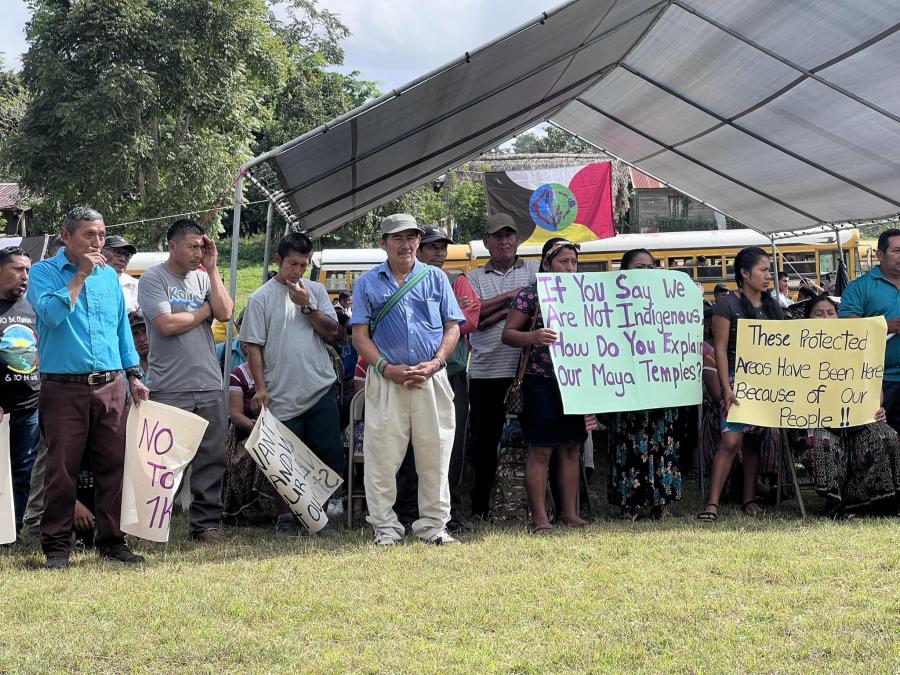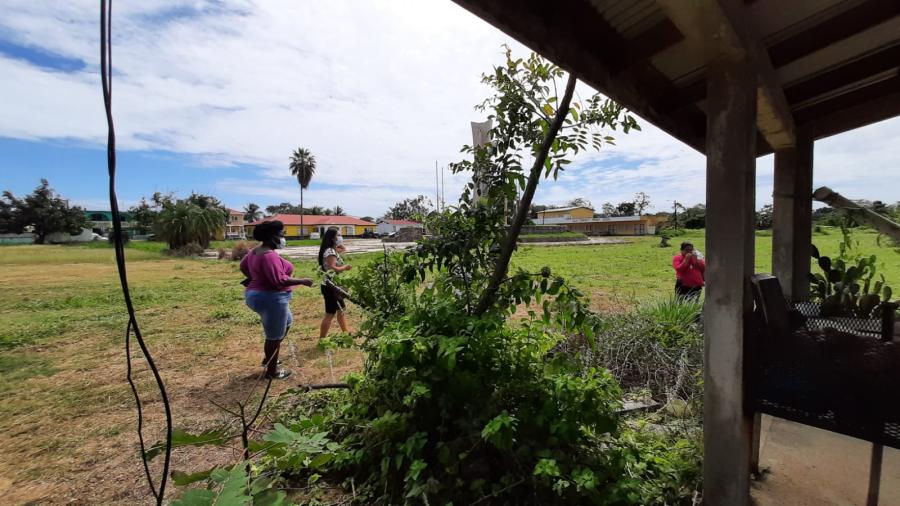
Maya Q’eqchi’ and Mopan Peoples from southern Belize have always fought for their right to live peacefully in their own lands. Belize only gained its independence from Great Britain in 1981 after a long negotiation between Great Britain, Belize’s campaigners for independence, and Guatemala, who claimed part of Belize’s territory. The latest ruling of the Caribbean Court of Justice, issued in November 2022, stated that Belize is failing to respect and implement the Maya Peoples’ right to their land and self-determination as recognized in past court decisions and enshrined in international instruments.
The Belizean State’s independence from British colonialism did not mean independence from colonial powers for Indigenous Peoples in Belize. The rights and territories of the Indigenous Peoples of Belize—specifically the Mopan and Q’eqchi’ Maya Peoples—continued to be disputed in an entanglement of economic and development interests by foreign companies and collusion of Belizean authorities with these investments.
Historically, much of the turmoil comes from the interest certain companies have in the resources found in Maya Peoples’ land and that the State of Belize has been giving preferential treatment to businesses. One of the recurrent faces in this conflict is Texas-based oil company, US Capital Energy, which has long pursued drilling rights within the Maya Peoples’ territory. In 2010, the government used its authority over the Sarstoon-Temash National Park (which is established on Mayan ancestral territories) to grant oil concessions to this company. US Capital Energy started the exploration phase immediately which led to a breakdown of the social fabric as the community members became divided, some enticed by promises of employment that never did materialize.
In 2007, the Maya people of Southern Belize welcomed the judgment of the honorable Abdulai Conteh, Chief Justice of the Supreme Court of Belize at that time, who ruled in favor of Maya customary land tenure in the villages of Santa Cruz and Conejo, delivering a landmark decision that led to a 2010 ruling extending these rights to all Maya communities in Toledo. Chief Justice Conteh expressed it was his hope that this judgment would mark the beginning of providing an honorable settlement to the Maya people under the constitution of Belize, a recognition that Indigenous Peoples’ rights must be understood within the context of historical injustices against them and that such landmark positive decisions mark an opportunity for reconciliation. However, the government of Belize did not take this opportunity and continued denying Maya their land rights in several appellate courts.
In April 2015, the case reached the highest court of Belize, the Caribbean Court of Justice, which delivered a decision known as a Consent Order in favor of Maya land rights. The Consent Order recognizes that the Maya Peoples of Belize hold customary land rights over the land that they occupy, meaning Maya land ownership is constitutionally protected. The court retained supervision of the implementation of the ruling to ensure that the government complied, and could enforce fines if it did not. The appellants in this case were the Toledo Alcaldes Association, which is made up of a collection of alcaldes (traditionally elected leaders) from each Maya village, and the Maya Leaders Alliance, who provide the alcaldes with technical support and has spearheaded a campaign for the full recognition of the Maya as Indigenous Peoples in Belize.
In spite of this benchmark ruling, the State of Belize continues to refuse to properly implement Free, Prior and Informed Consent (FPIC) in decisions concerning the Maya people of southern Belize. With the assistance of the Maya Leaders Alliance and Toledo Alcaldes Association, the Maya created their own FPIC protocol in 2014, known as the Maya Consultation Framework, which was endorsed by the 39 Maya villages of the region. However, in 2020, the State created an alternative FPIC protocol unilaterally and without the consent of the Maya Peoples. Besides the lack of consultation in its development, this protocol also includes several concerning issues such as changing the word “consent” to “consultation.” The government’s version of the protocol was shared in some Maya villages and with certain NGOs, but not with the traditional authorities.
At the beginning of 2022, seven years after the upholding of their rights by the Caribbean Court of Justice, the Ministry of Indigenous Peoples Affairs and the Maya Land Rights Commission finalized and filed the 2020 version of their Free, Prior and Informed Consent protocol without any consent, even though the 2015 ruling specifically ordered the government to consult with the appellants and the chosen representatives of the Maya people.
On November 29, 2022, the Caribbean Court of Justice hosted the hearing of arguments regarding the compliance of the State of Belize with the ruling in Maya Leaders Alliance v The Attorney General of Belize. At the time of the initial ruling in 2015, Pablo Mis (Maya Q’eqchi’) who was then Program Director of the Maya Leaders Alliance, commented about the heavy toll this judicial battle had taken on the Maya people: “We have been dragged through the courts, we have been placed against each other, and we have been called immigrants to the lands where the sacred bones of our ancestors rest. Like the trees of our land we swayed under pressure but kept reaching out to the sunlight. Our spirit was never broken.”
Cultural Survival followed up with Mis, who is currently Program Director for the Julian Cho Society, in December, shortly after the compliance hearing. Mis is from Laguna Village in the Toledo District and works directly with the Toledo Alcaldes Association. He has been advocating for Maya land rights for over a decade.
Cultural Survival: Tell us about the recent development of the FPIC protocol in Belize.
Pablo Mis: Recently the Caribbean Court of Justice held its compliance hearing and the judges reminded both the government of Belize and the Maya Peoples’ representatives that it is in their interest to monitor how the judgment is being implemented because this is a very important part of the development of the region and of advancing the protection of all citizens. The government often appears to forget that what we are trying to implement did not come out of their goodwill...in fact, the judgment that we have is the result of 30 years of denial of those very rights by the same government. It’s a good learning moment for the Maya people to also not forget that this is a judgment that deserves to be implemented [as it is] nothing less than what is already established as minimum standards of international laws.
CS: How does the government of Belize benefit from excluding the Maya Leaders Association?
PM: Implementing the rights of Indigenous Peoples within the State system is a very complex process. There are many competing interests, but the bottom line is that Indigenous Peoples around the world are not asking for anything new or special. What they are asking for is what the rule of law has agreed is their inherent right. There is the need for creative and innovative tools that will help advance the implementation on the ground; one of those tools is FPIC. There is now an established standard for the implementation of that at the international level, and the Maya people have been very clear that we are not going to accept anything less than those standards.
One of the sticking points that we have not yet been able to agree on with the government is the inclusion of the collective representation of the Maya people through their traditional leaders. Of course it would be in the interest of the government to exclude the traditional leaders collectively, because Indigenous Peoples around the world are clear that together we are stronger. We are a collective people; the community is the highest body of decision making. So it is quite bizarre for us when the government says we will include the individual leaders but we will not include the collective nature as representatives of their people. The only entity that stands to benefit from excluding the traditional leaders from the FPIC protocol in Belize is the government of Belize, because it would have a weaker Maya side to engage with.
CS: Tell us what happened at the compliance hearing.
PM: The Court was not very happy when the government reported that it has finalized its FPIC protocol and is now applying it in the Maya communities and translating it into Maya languages, because the representatives of the Maya people have not even received the final version. The court reminded the government that what they’re doing is not voluntary but the result of litigation, that there is a consent order that needs to be implemented. I think that was a very powerful reminder. The implementation needs to be a process of healing, a process of reconciliation, and a process of trust building. When you have the government of Belize unilaterally finalizing all these documents, this does not go well with reconciliation and trust building; it bears more space for further erosion of trust, division of communities, and the weakening of the protection of the rights of the Maya people.
CS: What is the wish of the Maya Leaders Alliance going forward?
PM: Our efforts as the Maya people of southern Belize—and I believe this is also the efforts of all Indigenous Peoples around the world—must be understood in the context of our respective countries growing their democracy. The manner in which they implement such an important decision should be seen as indicators of the maturity of our government in relation to democracy in our countries. There is an opportunity in Belize for the government to reset its approach, to think of the implementation in the context of development from a perspective that upholds the rights of all citizens.
Photo: Screen grab of OHCHR video marking the 10-year anniversary of the UN Declaration on the Rights of Indigenous Peoples, showing a Maya village in Toledo, Belize.


